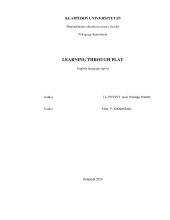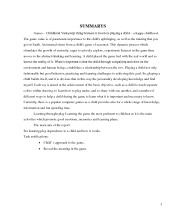Learning Through Play



Learning through play.
Games learning method is widely used in non- formal learning situations, however formal education in it looked like a mini and to non – traditional activities. From the very first day the child is traying to understand the world, exploring, rolling, throwing, placing objects in the mouth. We call it the games, and the children – this is a serious action and you learn to know the world. The game is not only fun, but also helps to learn and at the time the child is gaining leeway becomes like an explorer, develops and develops new skills, playing educational games are exposed to basic child harvest: Vision, hearing, touch and emotion. Because young children there is no difference between play and learning for them it is one and the same. He does not feel that playing is learning how to be self-confident, how to build relationships with nearby to expand their language, observe the rules distinguish between what is healthy and useful way to define your own or a friend's personality. Children are very important to the game, meaning that he like and is interested in, but also it is important to achieve a result.
An adult should explain the meaning of the child to the game, as he must know and understand why useful for playing games and entertainment that is associated not only with leisure time, learning, but also with his mind. The child has understood the possibility of appropriate conditions, aid to experiment and develop their skills. However, we can overlook certain internal processes in which the child has improved or newly learned. But we have a child together and encouraged him to play that skills like emotional expression, and to keep alive the way a child would become a strange environment more ambitious and self-confident. Common sense is a child game enjoyable activities in which it can act spontaneously create their own dreams, rules, control of the situation. The game created a hypothetical situation, and relates to a particular object or desire. At the time of the child's behavior determined by the surrounding circumstances in which the action takes place, usually playful behavior that arises out of the same character.
Children are important to play not only one, but with an adult. One playing the child will learn to concentrate, to work independently, self-reliance, and playing with others will learn to share, to understand the feelings of others, to cooperate. Groups playing children learn to know yourself, the environment, adjacent develop various skills as well as able to wait their turn. A child playing can overcome their fear, to experience new developments in the understanding of the environment and to act in it.

















